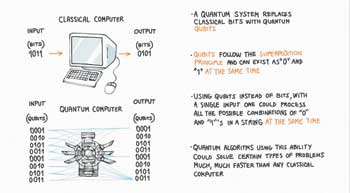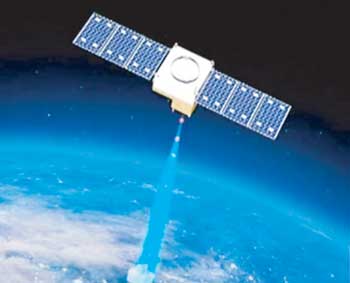Quantum information -
the future of communications and computing technology
We all know that technology, in whatever form, is, can and will always be improved upon, its performance pushed further. What most of us do not know, however, is about a certain development which, using the effects of quantum physics, could be ‘programmed to perform any computational task that can be performed by any physical object.’ Ladies and gentlemen, boys and girls, dear readers, with reference to our career counselling series, this is of course all about quantum computing.
Last month, Habib University organised its first Quantum Information Summer School (QISS), an initiative of Dr. Jibran Rashid. Dr. Rashid, a member of Habib University’s Computer Science faculty, is as driven by his passion for enhancing the ability to process information as he is for being a teacher par excellence to his students, providing them every bit of assistance possible to nurture their interest. Understandably, when Us approached Jibran for an interview regarding the field and the University’s collaboration between Pakistani and international experts and students, he conceded.
Us: How would you define quantum computing in layman’s terms?
JR: Quantum Information and Computation surfaced in the scientific literature around the 1980s. The motivation of the field is to try to build computers that use the laws of quantum mechanics to obtain a computational advantage over classical computers.
How would a quantum computer obtain this advantage? Imagine two waves and the phenomenon of interference wherein they superimpose one another and result in a wave that is the net effect of the individual waves; they either cancel or reinforce each other.
Quantum computing uses wave-like properties of particles like electrons and photons to construct such interference behaviour at a massively parallel scale. A quantum algorithm then orchestrates this behaviour to ensure just the right wave amplitudes enforce each other and, as a result, increase the probability of getting the right answer of our computation. Using this effect, scientists expect to build computers that will be able to solve problems which would take a classical computer longer than the life time of the universe to solve.
Us: So, that’s the only main difference between a quantum computer and a classical one?
JR: Yes, there are other differences but in some sense this is the key ingredient.
A killer application for quantum computing is breaking numbers into their prime factors; something we are taught to do in primary school. The ability to factor very large numbers quickly is an important one since it allows us to break commonly employed encryption schemes to secure transactions online. These schemes are currently secure against classical computers, but can be easily broken by someone who has access to a quantum computer. Since no one currently knows how to build a scalable quantum computer, our transactions are secure for the moment. At the same time, there exist companies that provide quantum encryption solutions, which are secure even against a fully-functional quantum computer. Their security is based not on our ability to factor numbers, but on foundational principles of quantum physics.
Us: But, currently, it’s not possible for anyone to create and possess quantum computers, right?
JR: Right now, there’s a huge incentive and large research projects going on across the world to try and build a quantum computer. But, no one actually has been able to build one.
This is not to say that approaches, like nuclear magnetic resonance and quantum optics among many others, have not been proposed and considered already. It’s just that no one actually knows how to build one that’s scalable and feasible. Scalable in the sense that the computer maintains a large quantum memory while at the same time allows precise control over the interference behaviour between the different qubits involved; feasible in the sense that this coherence is maintained for a sufficiently long enough time to allow for useful computation.
In fact, even among scientists, there is an ongoing debate whether the laws of Nature limit our ability to build a quantum computer. There are distinguished researchers on both sides with reasonable arguments for and against the realisation of a fully-functional quantum computer. It is important to note that this is a win-win situation. If successful, we will have access to a functional quantum computer that allows us to probe nature at a level that was inaccessible before. In the other scenario, we will have a proof that there is a gaping hole in our current understanding of some of the most fundamental physical theories
The interesting thing is that this field is not purely physics as some people tend to believe. To study quantum information and computation is basically to study ideas ranging from physics to information theory to computer science to engineering to philosophy, all merged together to solve a common problem.
Us: Recently, news headlines stated that China had launched the world’s first quantum satellite, Micius, claiming to build an unbreakable system of encrypted communications globally by 2030. Does that mean the quantum technology is available to us?
JR: As discussed earlier, there already exist companies that have commercialised cryptographic applications of quantum information. These are specialised devices that focus on building a secure communication channel. The satellite launched by China is part of an on-going research to develop and deploy such secure quantum networks over a global scale. And it’s not just China; places such as US, Canada, Europe and Australia have made similar investments. All of them have invested large resources in this area serving as a long-term strategic investment. The recent announcement of China’s successful launch is a reflection of commitment to this research.
Us: With reference to Pakistani context, could you elaborate on the relevance and scope of quantum computing?
JR: Quantum computing as a field is still very nascent in Pakistan. There are very few universities that are actively pursuing it. Another aspect to it is that since it’s a very diverse field, it’s not necessary that all research conducted is experimental in nature. There is a lot to be gained here, by asking the right basic questions and coming up with the right theoretical framework.
In practice, this means that there is a lot we can contribute to the field by developing the right set of human resources. I think it’s just about people - who are interested in the science - being provided the right training and an opportunity to think about developing solutions to the scientific challenges. What is required, then, is training of our human resources, providing them opportunities to expand upon their scientific background, and, finally, exchange and develop their ideas by contributing to the field.
Right now, we are still working on developing our training resources, but given the level of enthusiasm QISS students exhibit, I am confident that we can develop a sound plan to move forward. QISS was an initiative in that regard as we want our students who are interested in the area to have the liberty to come and talk to people who are experts in the field and, consequently, have an idea of the common problems in the field. This year, the speakers included Dr. Barry Sanders (IQST, Canada), Dr. Muhammad Sabieh Anwar (LUMS, Lahore), Dr. Abuzer Yakaryilmaz (LNCC, Brazil) and Dr. Benno Salwey (Freiburg, Germany).
The spectrum of students at QISS was truly diverse. We had exceptional students at the high school level to tenured faculty at some of the best Pakistani universities. One hope is that the sooner we can reach out to students interested in research, the better. In my opinion, developing a research ethos early is a key factor that distinguishes a good researcher from a great one.
In terms of practical concerns and scope, companies have already commercialised specific aspects of quantum information technology. Technology leaders like IBM, Microsoft and Google have their own research labs focused on developing practical applications of the technology. There is an understanding that, in the long run, this is a field with no dearth of opportunities. At the same time, it does require a longer training commitment from the student than a standard computer science program.
Us: You focus much on lack of human resources. Is this the reason why the field has not developed yet in Pakistan?
JR: Definitely. The lack of opportunities to develop was something evident in nearly all discussions with QISS attendees. Moving forward we plan to develop a sustainable effort for providing such resources. Dr. Barry Sanders also delivered the public talk titled ‘Symmetries: From Abdus Salam’s Universe to Quantum Information Technologies’. Dr. Sanders has engaged with the Chinese scientific community since the 1990s and has been a close observer of its rapid scientific growth. A natural path is to learn from his observations in developing our own programmes.
A common sentiment is that people today can learn everything they need to know about a field on the internet. While it is true that most of the content in terms of information is available online - in fact, nearly all scientific publications in the area of quantum information are available for free in the form of online preprints - it is, however, an unreasonable expectation from a student to discern between quality research work and the mass of junk data that is also available online. Not to mention developing the persistence required to chip away at a research problem, a quality which, for most of us, is acquired through gradual training rather than being innate.
One of the main takeaways of QISS was that it should not be a one-time initiative. We have to ensure that such programmes are held on a regular basis with support infrastructure provided to students throughout the year. A steering committee comprising of faculty from Habib, LUMS and NUST has been developed with the goal of developing a long-term strategic plan. QISS 2017 will be organised by Dr. Ayesha Khalique at NUST, Islamabad. Students from QISS 2016 have already taken an initiative to organise themselves through social channels, a medium we plan to use more effectively in the future.
Currently, we lag way behind in the scientific world. It is a clichéd answer, but it is also a true and an honest answer. I think it is not because of lack of talent - talent exists aplenty; it is because of lack of training. If anyone has a thirst for knowledge, it should be properly channelled and cultivated.
Us: Last but not the least, could you discuss the contributions of Dr. Abdus Salam and how his work has influenced the current researches in the field?
JR: As Dr. Barry Sanders highlighted during his talk, Dr. Salam’s pioneering work was of identifying unifying symmetries. Quantum information as a field shares many of these features of identifying commonalities between different fields and unifying them to gain a new perspective.
However, in addition to the science, a legacy of Dr. Salam is the culture of scientific research and training that he established through his students in Pakistan and initiatives such as ICTP. It is a testament to his ability that Pakistan was recognised during his time as a place where scientific breakthroughs can occur. Reinvigorating that spirit of discovery would be a fitting tribute.
Note: Video resources from QISS and additional information will be made available at http://habib.edu.pk/qiss2016/
FYI
‘Bit’ is the fundamental building block of a classical computer, existing either distinctly as zero or one.
Quantum bit or ‘qubit’ within the quantum model encodes zero and one as two distinct quantum states, while allowing a qubit to be in a superposition of the two states as well.